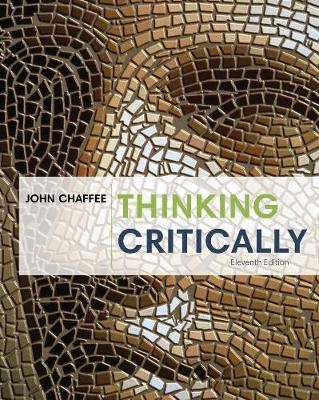
Thinking Critically
Wadsworth Publishing Co Inc (Verlag)
978-1-285-43011-9 (ISBN)
- Titel erscheint in neuer Auflage
- Artikel merken
THINKING CRITICALLY helps students become sophisticated thinkers by teaching the fundamental cognitive process that allows them to develop the higher-order thinking abilities needed for academic study and career success. The text compels students to use their intellect to think critically about subjects drawn from academic disciplines, contemporary issues, and their life experiences. The text begins with basic skills related to personal experience and then carefully progresses to the more sophisticated reasoning skills required for abstract, academic contexts. Each chapter provides an overview of an aspect of critical thinking, such as problem-solving, perception, and the nature of beliefs. Thinking Activities, thematic boxes, and writing assignments encourage active participation and prompt students to critically examine others’ thinking, as well as their own. Thought-provoking and current readings from a wide variety of thinkers get students to think about complex issues from different perspectives. Each chapter ends with self-assessment activities that help students monitor their own progress as critical thinkers.
John Chaffee, Ph.D., is a professor of philosophy at The City University of New York, where he has developed a Philosophy and Critical Thinking program that annually involves 25 faculty and 3,000 students. He is a nationally recognized figure in the area of critical thinking, having authored leading textbooks and many professional articles. He also has conducted numerous conference presentations and workshops throughout the country. In developing programs to teach people to think more effectively in all academic subjects and areas of life, Dr. Chaffee has received grants from the National Endowment for the Humanities, the Ford Foundation, the Annenberg Foundation, and the Corporation for Public Broadcasting. He was selected as New York Educator of the Year and received the Distinguished Faculty Award for Diversity in Teaching in Higher Education.
1. Thinking.
Living an “Examined” Life. A Roadmap to Your Mind. Working Toward Goals. Images, Decision Making, and Thinking About Visual Information. An Organized Approach to Making Decisions. Living Creatively. Thinking Ahead.
2. Thinking Critically.
Thinking Actively. Carefully Exploring Situations with Questions. Thinking Independently. Viewing Situations from Different Perspectives. Supporting Diverse Perspectives with Reasons and Evidence. Discussing Ideas in an Organized Way. Reading Critically. Analyzing Issues.
3. Solving Problems.
Thinking Critically About Problems. Introduction to Solving Problems. Solving Complex Problems. Accepting the Problem. Solving Nonpersonal Problems.
4. Perceiving and Believing.
Actively Selecting, Organizing, and Interpreting Sensations. Perceiving and Believing. Believing and Perceiving. Types of Beliefs: Reports, Inferences, Judgments. Reporting Factual Information. Inferring. Judging.
5. Constructing Knowledge.
Believing and Knowing. Knowledge and Truth. Thinking Critically About Your Beliefs. Using Perspective-Taking to Achieve Knowledge. Beliefs Based on Indirect Experience.
6. Language and Thought.
The Evolution of Language. The Symbolic Nature of Language. Using Language Effectively. Using Language to Clarify Thinking. Using Language in Social Contexts. Using Language to Influence.
7. Forming and Applying Concepts.
What Are Concepts? The Structure of Concepts. Forming Concepts. Applying Concepts. Defining Concepts. Relating Concepts with Mind Maps.
8. Relating and Organizing.
Chronological and Process Relationships. Comparative and Analogical Relationships. Causal Relationships.
9. Thinking Critically about Moral Issues.
What Is Ethics? Your Moral Compass. The Thinker’s Guide to Moral Decision Making.
10. Constructing Arguments.
Recognizing Arguments. Evaluating Arguments. Understanding Deductive Arguments. Constructing Extended Arguments.
11. Reasoning Critically.
Inductive Reasoning. Empirical Generalization. Fallacies of False Generalization. Causal Reasoning. Causal Fallacies. Fallacies of Relevance. The Critical Thinker’s Guide to Reasoning.
12. Thinking Critically, Living Creatively.
Living a Life Philosophy. Choose Freely. Deciding on a Career. Choosing the “Good Life.”
| Verlagsort | Belmont, CA |
|---|---|
| Sprache | englisch |
| Maße | 188 x 233 mm |
| Gewicht | 904 g |
| Themenwelt | Geisteswissenschaften ► Philosophie ► Logik |
| Naturwissenschaften ► Biologie ► Biochemie | |
| ISBN-10 | 1-285-43011-5 / 1285430115 |
| ISBN-13 | 978-1-285-43011-9 / 9781285430119 |
| Zustand | Neuware |
| Haben Sie eine Frage zum Produkt? |
aus dem Bereich



